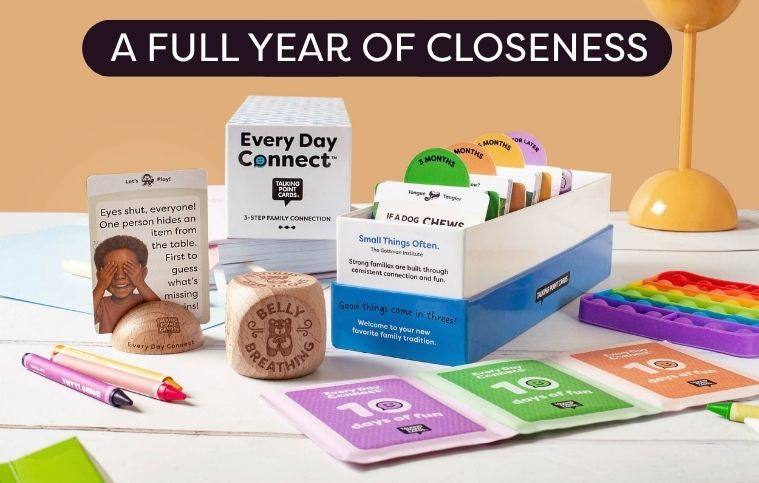SHOP
About
Building Resilience in Kids Through Conversation
The Power of Getting Talking

Ever wonder how some kids seem to bounce back from anything life throws at them? While others crumble at the slightest setback? The secret sauce might just be good old-fashioned conversation. Yep, you heard that right - talking. But not just any talking. We're talking about the kind of open, honest chats that build relationships, foster communication skills, and ultimately create little resilience powerhouses.
So buckle up, parents and caregivers, because we're about to dive deep into the world of kid-friendly communication. Trust me, by the end of this, you'll be itching to strike up a convo with the young'uns in your life. And who knows? You might even learn a thing or two yourself.
Why Resilience Matters (Like, A Lot)
Before we jump into the how-to's of chatting up your kids, let's talk about why resilience is such a big deal. In a world that's constantly throwing curveballs (hello, global pandemics and climate change), being able to adapt and bounce back is pretty much a superpower.
Resilient kids are like those inflatable punching bags - you know, the ones that pop right back up no matter how hard you knock 'em down.

They:
-
Handle stress better
-
Recover from setbacks faster
-
Have better mental health outcomes
-
Are more likely to take on challenges
-
Generally have a more positive outlook on life
Sounds pretty great, right? But here's the kicker - resilience isn't something kids are just born with. It's a skill that can be learned and strengthened over time. And that's where open conversations come in.
The Magic of Getting Talking
Alright, so we've established that resilience is awesome. But what's all this about talking? Well, my friends, open conversations are like the secret training ground for resilience. They're where kids learn to:
-
Express their feelings (without exploding)
-
Work through problems (instead of avoiding them)
-
Build strong relationships (which act as a safety net)
-
Develop critical thinking skills (because life isn't always straightforward)
-
Gain confidence in their own abilities (hello, self-esteem boost!)
Think about it - when kids feel comfortable talking openly about their thoughts and feelings, they're less likely to bottle things up. And bottled-up feelings? Those are like ticking time bombs. No bueno.
The Art of Open Conversations: A How-To Guide
Now, I know what you're thinking. "Great, I just need to talk to my kids. Easy peasy!" But let's be real - getting kids to open up can sometimes feel like trying to pry open a particularly stubborn oyster. So here are some tips to help you master the art of open conversations:
1. Create a Judgement-Free Zone
First things first - you gotta make it clear that your conversations are a safe space. No judgement, no criticism, just open ears and open hearts. This means:
-
Listening without interrupting
-
Avoiding phrases like "You shouldn't feel that way"
-
Showing genuine interest in what they're saying
Remember, the goal is to keep the conversation flowing, not to win a debate or prove a point.

2. Ask Open-Ended Questions
Wanna kill a conversation faster than you can say "resilience"? Ask yes or no questions. Instead, try open-ended questions that encourage kids to elaborate. For example:
-
Instead of "Did you have a good day at school?", try "What was the most interesting thing that happened at school today?"
-
Rather than "Are you worried about the test?", ask "How are you feeling about the upcoming test?"
These types of questions show that you're genuinely interested in their thoughts and experiences, not just looking for a quick status update.
3. Share Your Own Experiences (But Don't Dominate)
Kids love to know that they're not alone in their experiences. Sharing your own stories can help normalize their feelings and show that even adults struggle sometimes. But remember - this isn't your therapy session. Keep it brief and relevant, then steer the conversation back to them.
4. Practice Active Listening
Active listening is like a superpower in the world of communication. It involves:
-
Making eye contact
-
Using non-verbal cues (like nodding)
-
Reflecting back what you've heard ("So it sounds like you're feeling frustrated because...")
-
Asking clarifying questions
-
When kids feel truly heard, they're more likely to keep the conversation going and dig deeper into their feelings.
5. Timing is Everything
Trying to have a deep conversation with a hangry kid right after school? Good luck with that. Pay attention to when your kid seems most receptive to talking. For some, it might be during a car ride. For others, it could be while doing a shared activity like cooking or walking the dog.
6. Make it a Regular Thing
Resilience isn't built in a day, folks. Make open conversations a regular part of your routine. Maybe it's a weekly family dinner where everyone shares their highs and lows, or a nightly check-in before bed. The more you practice, the more natural it'll become.
The Ripple Effect: Beyond Resilience
Here's the cool thing about fostering open communication with kids - the benefits go way beyond just building resilience. We're talking about:
"The single most important thing you can do for your family may be the simplest of all: develop a strong family narrative." - Bruce Feiler
-
Stronger family bonds: When kids feel comfortable opening up, it creates a sense of closeness and trust within the family.
-
Better academic performance: Kids who can articulate their thoughts and feelings often do better in school. Go figure!
-
Improved social skills: All that practice talking at home? It translates to better communication with peers and teachers.
-
Enhanced emotional intelligence: Regular conversations about feelings help kids become more aware and understanding of their own emotions and those of others.
-
Increased self-esteem: When kids feel heard and valued, it boosts their self-worth.
Overcoming Conversation Roadblocks
Now, let's be real for a second. This whole "open conversation" thing? It's not always gonna be smooth sailing. You're gonna hit some roadblocks. But don't worry, we've got you covered:
The One-Word Answer Kid
You know the type. You ask how their day was and get a grunt in response. For these kids, try:
-
Asking more specific questions ("What did you have for lunch today?" instead of "How was school?")
-
Using a conversation starter jar with fun, random questions
-
Sharing something about your day first to model the kind of response you're looking for
The Oversharer
On the flip side, some kids will talk your ear off about every little detail of their day. While it's great that they're open, you might need to gently guide the conversation to more meaningful topics. Try:
-
Asking follow-up questions that dig into their feelings about events
-
Summarizing what you've heard and asking if you've understood correctly
-
Gently redirecting if the conversation gets off track
The "I'm Fine" Kid
When "fine" is their favorite word, it can be tough to get to the real feelings underneath. Try:
-
Acknowledging that "fine" is okay, but you're there if they want to talk more
-
Sharing a time when you said you were "fine" but actually weren't
-
Using a feelings chart to help them identify and express their emotions

The Long Game: Building a Culture of Communication
Alright, we're in the home stretch here, folks. Building resilience through open conversations isn't a one-and-done deal. It's a long game, a marathon rather than a sprint. But the payoff?
Totally worth it.
By consistently creating opportunities for open dialogue, you're not just building resilience. You're creating a family culture where communication is valued, feelings are respected, and everyone's voice is heard. And that, my friends, is the kind of foundation that can weather any storm.
So go forth and get talking! Ask questions, listen actively, share your own experiences, and watch as your kids blossom into resilient, emotionally intelligent little humans. And remember, it's not about being perfect. It's about being present, being genuine, and being willing to learn and grow alongside your kids.
Because at the end of the day, the most resilient families are the ones who face life's challenges together, one conversation at a time.
Now, if you'll excuse me, I have a very important conversation to have with my cat about why it's not okay to knock everything off the kitchen counter. Wish me luck!
LIKED THIS ARTICLE?
SIGN UP FOR MORE!






